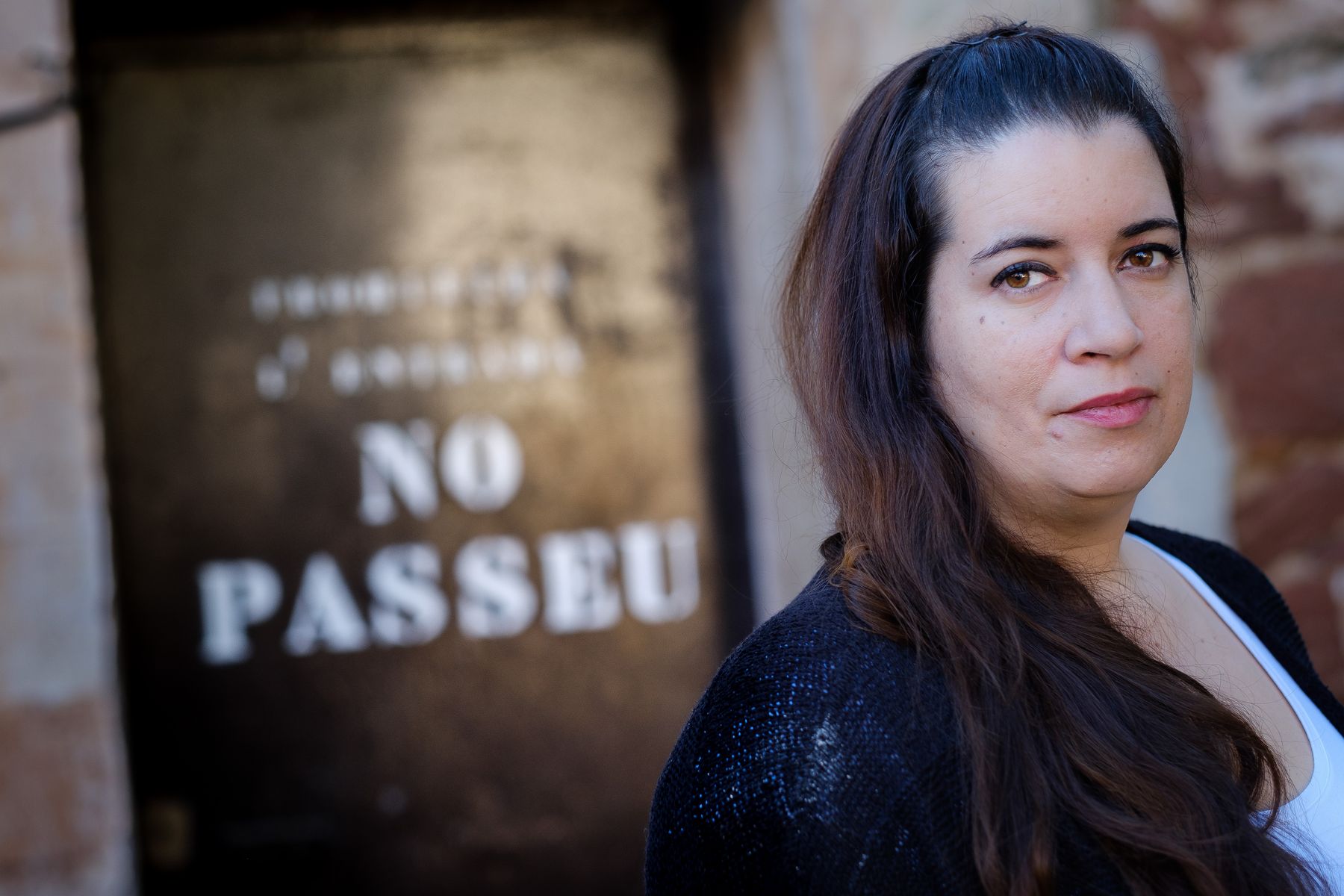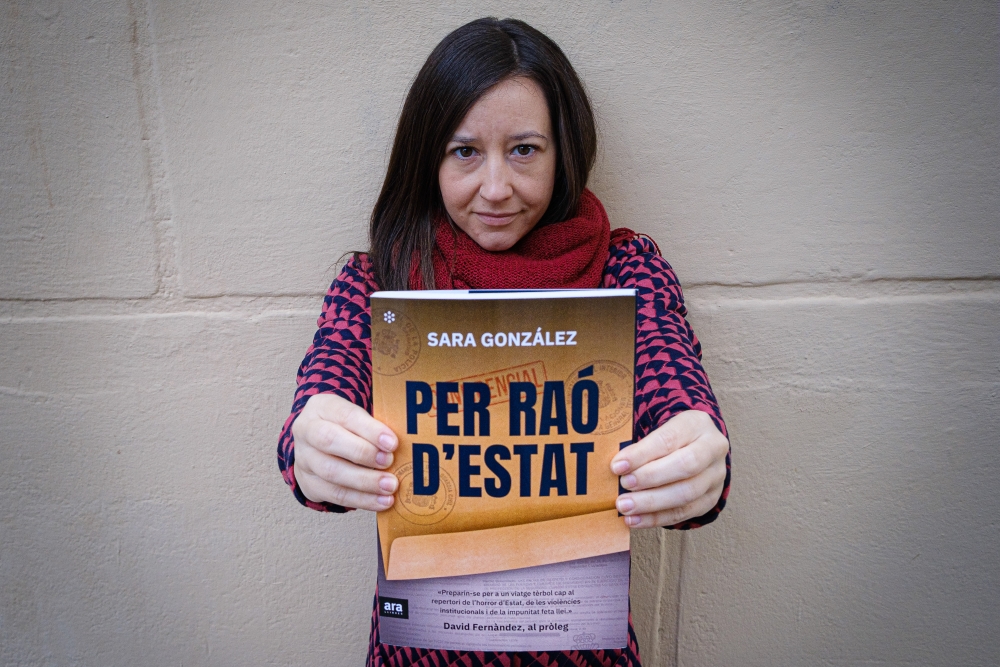"I live in a prison without a cell."
- Tamara Carrasco (Sant Vicençs dels Horts, 1983) was arrested on 10 April by the Spanish Public Prosecutor's Office for crimes of terrorism, rebellion and sedition for "coordination of the CDRs" of Catalonia. After spending two days in the dungeons of Madrid, Diego de Egea testified to the judge and was released with precautionary measures: do not leave his village and present himself every Monday to the judge of Gavà. He spoke to ARGIA following the decision of the Spanish National Audience to stop investigating Carrasco, in the locality he has been locked up since April.

The National Hearing will suspend proceedings against you and against Adrià Carrasco for money laundering, as reported by the Ministry of the Interior. How did you get the news?
I have contradictory feelings. I'm happy, but furious. The last seven months have been very hard. To make a comparison, I feel like I have to have a car accident because of a person who is drunk and be happy because I've survived.
A month ago you asked for the precautionary measures to be reduced. How is the current decision understood?
Then the prosecution and the judge told me that it was impossible to reduce precautionary measures, because the CDRs were alive. What's more, when my mother had an accident, they didn't give me legal permission to go and see her. Spanish justice is random.
“When I was fighting with the sergeant of the Madrid cell, he told me that I had not put the bomb on and he responded with all peace of mind that, today, to be a terrorist, no blood was needed.”
It will now be the judge of the National Court who will settle the case. What are the next steps?
The judge in Barcelona must take two decisions. The first, the suspension of precautionary measures and the second, the filing of the case or the opening of a judicial process for public disorder.
How do you deal with this new phase?
Reinforced. I am convinced of my innocence because I have done nothing. Although Spanish justice makes it difficult, we cannot forget that the right to freedom of expression and political dissent is ours.
Have you noticed any police surveillance? How is coexistence with the harshness of precautionary measures?
You can master fear. But of course, I'm worried that my family and my friends are also suffering repression. Spanish justice uses time in its favour: we have the phones painted, we go down the street and we are followed by some who have a strange shape and a pinganillo in the ear, that is, civil guards. Helplessness has been terrible.

Let's start. On April 10, the Civil Guard woke you up in your house.
It was a total shock. When I slept, I heard the bell, I opened the door and I found ten men shouting that they accused me of terrorism, with my face covered and the shrapnel in my hand.
ETA announced the end of its business in April 2017. A year later, you were accused of terrorism.
After registering the house and taking her to declare to Madrid, I asked that question. I needed a lot to understand what was going on. Then, I understood from David Fernandez’s book ‘Chronicles of 6’ that our cause was not against Adri or Tamara, but against the movement we represented. Spanish justice needs, from time to time, to put on the table the crime of terrorism and to promote fear among the citizens in defense of Spanish unity. When you don't have enemies, you create them.
Some have compared the CoR with ETA. What do you think?
It's painful. I remember perfectly well that when I stopped and fought with the sergeant in the Madrid cell, he told me that I had not put the bomb on and he responded with all peace of mind that, today, to be a terrorist, there was no need for blood. The bad thing is that he was right! Well, two months ago I had the opportunity to meet the father of Javier, the child killed in the attacks in Barcelona. He confessed to me that when he followed my arrest on television he was angry, because they were the ones who killed his son and his brother-in-law the terrorists, and not me.
Can you imagine what you live now when you started at CDRs?
By no means. I knew that because I was in CDRs, I could have problems, of course. But I never imagined I was accused of terrorism. Public disorder, at most… In any case I think we have fallen too much into goodness. In recent months I have had the opportunity to meet some activists who have long been fighting repression in Spain, in Euskal Herria, in Madrid… And I have realized that we have played innocently. We do not prepare for the harshness of repression in Spain. However, the play has gone wrong, in these seven months I have become stronger, bringing me closer to the mobilisations against repression. As a person, I've evolved a lot.
There are those who believe that, after the repression that Catalonia has experienced in the last year, until now, there has been a lack of knowledge, for example, of what happened in the Basque Country. Do you agree?
Totally. We are now living what you have suffered in Euskal Herria for a long time. In Catalonia, unfortunately, we are now opening our eyes. It is true that we now have the advantage of social media and that it is easier to broaden what happens. In the Basque Country, however, repression was curtailed by saying that everything was ETA. And out of there, that's the message that opened up to us and came to us.
“Who knows, when they came to stop me, if the mother had been there and said that the Civil Guard was at the door… maybe I too would have escaped the window”
Adrià Carrasco was also charged for the same crime. He decided to leave Catalonia. Would you, too?
I'm not going to give clues. In any case, I think Adri's was not a decision. In a few seconds, you have to take one or another hot route. Who knows, when they came to stop me, if the mother had been there and said that the Civil Guard was at the door… maybe I too would have escaped the window.
Do you have any contact with Adri?
Of course. Contact has been constant. We have both suffered the violence of repression, but each one has taken it on a different path. Adri has enormous strength, he has had to build his life, starting from scratch, and he is making a strong political denunciation from a country that is not his own. We are protecting ourselves.
You also said that you are a political prisoner. Why?
Because I've been raped by freedom. I don't have bars, but I've been locked up in my village. If I put a leg out of Viladecans, they would stop me. I live in a prison without a cell.
In Viladecans, the PSC has the order to introduce Osasuna. How has the people responded to their case?
I have friends and not sisters. I'm going to have a beer with everyone. Ciutadans has created an imaginary about Catalonia that does not correspond to reality. Here we all know each other and I have felt arrogant, among other reasons, because there is no need to come to my case.
And outside Catalonia?
Yes, the answer has been terrible. I have received support in Catalonia but also in Madrid, in Euskal Herria and in the corners that I would never have thought: In Granada, Murcia, Galicia… That, of course, does not appear on television. This support has enabled me to make a more positive rather than negative reading.

You have shown that repression is not going to silence you by creating Prou Retaliation Politics.
Of course, what else can I do? If you want to annoy me and frighten me, you won't succeed. And I'm working hard not to influence the culture of fear inherent in repression. It is essential to master fear, to coexist with fear but to take some advantage. That is why we created the associationn.Ofrecemos psychological and legal protection, and many colleagues who have gone through the same context have already called us.
What reading do you make of the present attitude of the independence parties?
I'm wearing it very badly. I've talked a lot about this with Adri. As we come into play our skin, they are not able to agree. It's pathetic. They are politicians and their only function is to reach an agreement for the benefit of the citizens. And of course, if they fail to do so, we are faced with a serious problem.
What do you think the horizon of Catalonia is?
I don't know. I'm not neutral right now. I am closed in Viladecans and I follow it only via Twitter or via TV3 324 and I have the feeling that I lack information. However, I believe that the gap between the independence parties is clear and, therefore, there will be new elections. I hope that, over and above partisan interests, it will be able to give priority to the people and move forward, but to this day, I do not see it as clear.
Is this influenced by the fact that party representatives are also in prison or in exile?
No, we cannot be a reward. The mere agreement to respect the mandate of the people. And we citizens have a challenge: to go back to the street. We have to get back to mobilisation and, metaphorically, hit the table to make it clear to the government: wake up, if we don't get past it.

























